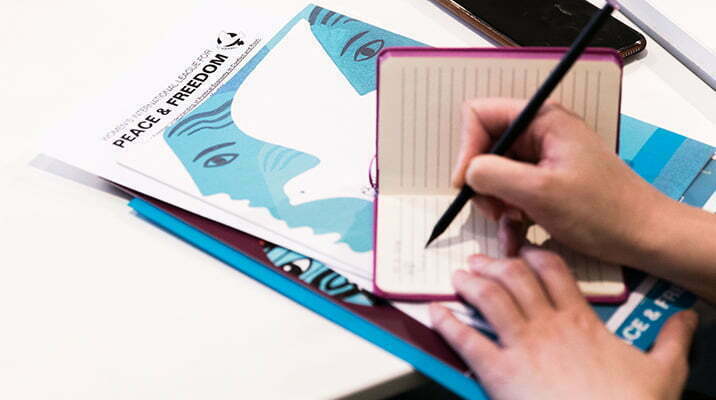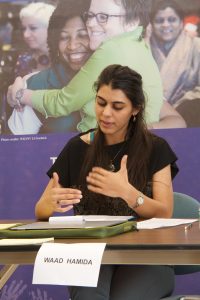WILPF Crisis Response and PeaceWomen Programmes hosted a delegation of women human rights activists from Libya, Yemen and Syria in New York between 23 and 27 October 2016. Our delegates attended the UN Security Council open debate on Women, Peace and Security that took place on October 25th 2016, and participated in several civil society events bringing their vast range of expertise in women’s rights, law and justice, documentation and peace building.
WILPF facilitated for several events, including a high-level roundtable hosted by the permanent mission of Switzerland to the United Nations; a public side-event entitled “Connecting Grassroots and International Efforts for Action: Leveraging our Local to Global WPS Movements”; and an interactive dialogue with graduate students at Columbia University. The delegates have also met with representatives of several representatives of Member States bilaterally.
Our delegates’ contributions showed that while the experiences of women in the ongoing conflicts in Libya, Syria and Yemen differ in scope and complexity, the challenges they face are all too similar. Overcoming these challenges requires serious commitment and carefully-tailored gendered responses from the international community, both at the political and humanitarian levels.
As reflected on the PeaceWomen analysis of the open debate, there was a general divide between statements that offered detailed insight into implementation efforts, persisting challenges, and suggested action steps, and statements that only elaborated more generally on the importance of the WPS agenda.
For Syrian women, detention and participation issues are critical
Our Syrian delegate Sema Nassar, who is an expert on documentation and issues of women detainees, was alarmed by the obvious disconnect between what the speakers talked about during the debate and what was actually happening on the ground. While the role of several Member States in advocating for enhanced women inclusion in the peace process must be recognised, Yet Syrian women’s role in the peace process has so far been limited and merely consultative. The number of women included in the process is not as important as the impact they will eventually have, which is why States need to explore further means and models of women inclusion in the process and not settle with what has been made available so far.
 The detention file is a critical concern in the case of Syria. While this file has been repeatedly tackled by numerous stakeholders, the gendered dimensions of detention and it’s disproportionate impact on women has not been addressed. This impact is not confined to women who have been detained, but goes beyond this to encompass the impact that the detention of men inflicts upon women.
The detention file is a critical concern in the case of Syria. While this file has been repeatedly tackled by numerous stakeholders, the gendered dimensions of detention and it’s disproportionate impact on women has not been addressed. This impact is not confined to women who have been detained, but goes beyond this to encompass the impact that the detention of men inflicts upon women.
Urnammu for Justice and Human Rights, a Syrian NGO where Sema is a board member, documented the detention of 85000 men and 4000 women; among these women, several have committed suicide after their release. They have stressed the need for gendered and comprehensive support programs and a functional referral system for women detainees upon their release.
Yemen: protracted crisis and increased arms transfers exacerbating impact on women
Rasha Jarhoum, a Yemeni women’s rights advocate and social policy researcher, stressed that the crisis in Yemen is amplified by cinditions that existed prior to the war. The lack of sustainable and proactive response to the years-long protracted crisis has made the process of developing humanitarian plan not inclusive despite the potential provided byUNSCR 2216 (2015).
 While 18 countries are sponsoring the peace process in Yemen, most of them are contradictorily supplying weapons to the Saudi-led coalition, which has been targeting highly populated areas by explosive weapons. Such contradictory policies are not only hindering the peace process, but are also aggravating already existing social phenomena in Yemen such as child recruitment, whereby a third of Yemeni militants are currently children.
While 18 countries are sponsoring the peace process in Yemen, most of them are contradictorily supplying weapons to the Saudi-led coalition, which has been targeting highly populated areas by explosive weapons. Such contradictory policies are not only hindering the peace process, but are also aggravating already existing social phenomena in Yemen such as child recruitment, whereby a third of Yemeni militants are currently children.
Because of this increased militarisation, gender-based violence has increased by 70%, accompanied by a surfacing of new GBV forms such as stoning. Women in Yemen are indiscriminately targeted with numerous types of abuses and deprivation of resources; for instance, they are forced or convinced by militants – if not brainwashed – to sell their gold to support war efforts.
While the status of women inclusion in the peace process in Yemen is very similar to that in Syria, Yemeni women have secured a commitment to 30% quota at the National Dialogue Conference in 2014. However, this commitment is yet to be reflected in practice.
Libyan women’s activism is in jeopardy

As the violence continues in Libya, women human rights defenders face constant intimidation particularly amidst the shrinking space of civil society. Waad Hmida, member of the Together We Build it organisation and co-founder of the Student Peace Movement in Tripoli University, explained how the freedom of movement and personal security of Libyan women activists are affected by the volatile security situation, as many of them were displaced to work outside the country and some cannot even go back to Libya to resume their work. The sustainability of women organisations’ work is in jeopardy particularly due to the lack of sustainable funding. While the level of women’s inclusion in the Libyan peace process is slightly higher than in other peace processes in the region, there are still no concrete measures or solid guarantees to ensure women’s presence and influence on the longer run.
Women must be at the core of the international community’s strategies
WILPF and the delegates from Yemen, Syria and Libya have developed recommendations for member states in order for their commitments to translate into action, particularly in the contexts of the ongoing peace processes in the region.
WILPF remains alarmed by the continuous challenges facing women rights activists in the region, and by the increasing militarisation that impacts women gravely and disproportionately. While the dire humanitarian situation is prevalent in all three countries, mainstream media has unfortunately failed to convey how that affects everyday lives of women.
WILPF strongly believes that the refugee issue is intersectional among the three countries and recognises that it has become an issue in Europe. However, we believe that it is only a consequence, and can only be contained through addressing its root causes with gender responsive policies and strategies.






